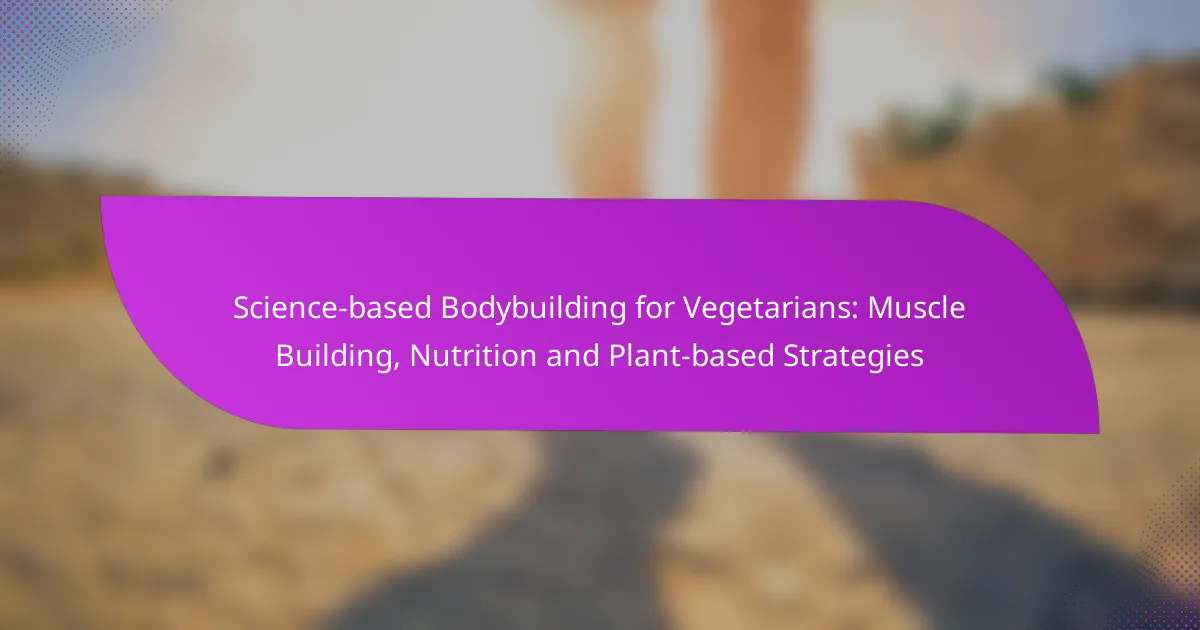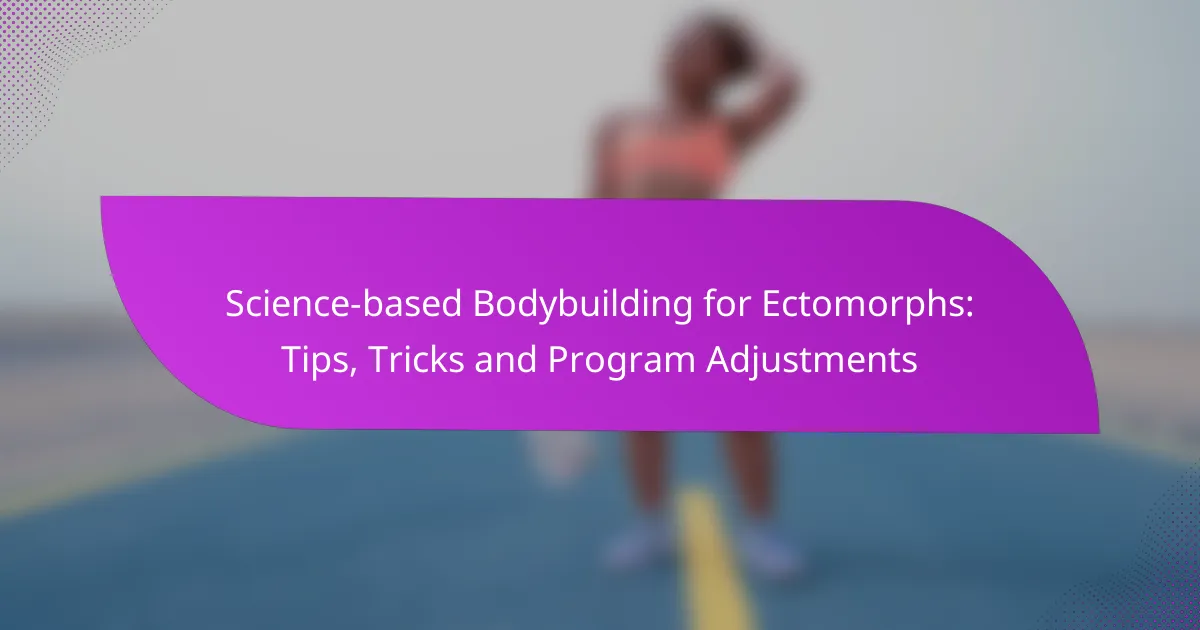Science-based bodybuilding for vegetarians emphasizes the importance of high-protein plant foods, proper resistance training, and strategic supplementation to effectively build muscle. By focusing on nutrient-dense options like legumes, nuts, seeds, and whole grains, vegetarians can meet their protein needs and support muscle growth while adhering to their dietary choices. Understanding meal timing and maintaining a caloric surplus further enhances their ability to achieve muscle-building goals.

How Can Vegetarians Build Muscle Effectively?
Vegetarians can build muscle effectively by focusing on high-protein plant foods, engaging in proper resistance training techniques, and considering appropriate supplements. By combining these strategies, vegetarians can achieve their muscle-building goals while adhering to their dietary preferences.
High-protein plant foods
Incorporating high-protein plant foods is essential for vegetarians aiming to build muscle. Options such as lentils, chickpeas, quinoa, and various beans provide significant protein content and essential amino acids. Aim for a daily protein intake of around 1.6 to 2.2 grams per kilogram of body weight to support muscle growth.
Other excellent sources include tofu, tempeh, seitan, and edamame. Nuts and seeds, while slightly lower in protein, can complement meals and snacks, adding healthy fats and additional protein. Combining different protein sources throughout the day can help ensure a complete amino acid profile.
Resistance training techniques
Effective resistance training is crucial for muscle building, regardless of diet. Focus on compound exercises like squats, deadlifts, and bench presses that engage multiple muscle groups. Aim for 3 to 5 sets of 6 to 12 repetitions per exercise, adjusting weights to ensure the last few reps are challenging.
Incorporate progressive overload by gradually increasing weights or resistance over time. This approach stimulates muscle growth and adaptation. Additionally, consider varying your workout routine every few weeks to prevent plateaus and keep your training engaging.
Supplement options for vegetarians
While a well-planned vegetarian diet can provide most nutrients, some supplements may enhance muscle-building efforts. Protein powders made from pea, rice, or hemp protein can help meet daily protein goals, especially post-workout. Look for products with minimal additives and a complete amino acid profile.
Creatine is another popular supplement that can benefit vegetarians, as it is primarily found in animal products. Supplementing with creatine can improve strength and muscle mass. Additionally, consider vitamin B12 and omega-3 fatty acids, as these may be lower in vegetarian diets and are important for overall health and recovery.

What Nutritional Strategies Support Muscle Growth?
Nutritional strategies that support muscle growth for vegetarians focus on adequate protein intake, meal timing, and maintaining a caloric surplus. By understanding these elements, vegetarians can effectively build muscle while adhering to their dietary preferences.
Essential amino acids sources
Essential amino acids (EAAs) are crucial for muscle repair and growth, and vegetarians can obtain them from various plant-based sources. Foods such as quinoa, soy products (like tofu and tempeh), legumes, and nuts provide a complete amino acid profile when consumed in combination.
For optimal muscle synthesis, aim to include a variety of these sources in your diet. For instance, pairing rice and beans can create a complete protein, ensuring you receive all necessary EAAs.
Meal timing for muscle recovery
Meal timing plays a significant role in muscle recovery, particularly after workouts. Consuming a protein-rich meal or snack within 30 to 60 minutes post-exercise can enhance muscle repair and growth.
Consider planning your meals around your workout schedule. A smoothie with plant-based protein powder, banana, and spinach can serve as an effective post-workout recovery option.
Caloric surplus for muscle gain
To gain muscle, a caloric surplus is essential, meaning you need to consume more calories than you burn. For vegetarians, this can be achieved by incorporating energy-dense foods such as avocados, nut butters, and whole grains into meals and snacks.
Aiming for an additional 250 to 500 calories per day can support muscle growth, depending on your activity level. Monitor your progress and adjust your intake as needed to ensure continued gains without excessive fat accumulation.

Which Plant-Based Foods Are Best for Bodybuilding?
For effective bodybuilding, vegetarians should focus on nutrient-dense plant-based foods that provide ample protein and essential nutrients. Key options include legumes, nuts, seeds, and whole grains, which can help support muscle growth and recovery.
Legumes and pulses
Legumes and pulses, such as lentils, chickpeas, and black beans, are excellent sources of protein and fiber. They typically contain around 15-25 grams of protein per cooked cup, making them a staple for muscle building.
Incorporating a variety of legumes into meals can enhance amino acid profiles. Pairing them with grains, like rice or quinoa, can create a complete protein source, essential for muscle repair and growth.
Nuts and seeds
Nuts and seeds, including almonds, chia seeds, and hemp seeds, provide healthy fats, protein, and important micronutrients. A handful of nuts can offer around 6-8 grams of protein along with omega-3 fatty acids, which are beneficial for recovery.
Consider adding nuts and seeds to smoothies, salads, or oatmeal for an easy protein boost. However, be mindful of portion sizes due to their high calorie density, aiming for about 30 grams per serving.
Whole grains
Whole grains like quinoa, brown rice, and oats are vital for providing energy and supporting muscle function. They typically contain 5-10 grams of protein per cooked cup and are rich in complex carbohydrates, which fuel workouts.
Incorporating a variety of whole grains into your diet can help maintain energy levels and promote recovery. Aim to fill half your plate with whole grains during meals for optimal performance and muscle growth.

What Are the Common Myths About Vegetarian Bodybuilding?
Many believe that vegetarian bodybuilding is ineffective due to misconceptions about nutrition and performance. Understanding these myths can help vegetarians build muscle effectively while adhering to their dietary preferences.
Protein deficiency misconceptions
A common myth is that vegetarians cannot consume enough protein to support muscle growth. However, many plant-based sources like lentils, chickpeas, quinoa, and soy products provide ample protein when consumed in adequate amounts.
To meet protein needs, vegetarians should aim for a daily intake of around 1.6 to 2.2 grams of protein per kilogram of body weight, depending on activity levels. Combining different protein sources, such as legumes with grains, can enhance the amino acid profile.
Carbohydrate fears
Some believe that carbohydrates are detrimental to bodybuilding, especially in a vegetarian diet. In reality, carbohydrates are crucial for fueling workouts and recovery. Whole grains, fruits, and vegetables provide essential energy and nutrients.
Vegetarians should focus on complex carbohydrates, aiming for about 45-65% of their total daily caloric intake from carbs. This balance supports sustained energy levels and optimal performance during training sessions.
Performance limitations
There is a perception that vegetarian athletes cannot perform at the same level as their meat-eating counterparts. This is not true; many elite athletes thrive on plant-based diets and achieve impressive results.
To optimize performance, vegetarians should ensure they consume a well-rounded diet rich in vitamins, minerals, and healthy fats. Regularly incorporating a variety of foods can help prevent deficiencies and support overall athletic performance.

How to Choose Supplements for Vegetarian Bodybuilders?
Selecting supplements for vegetarian bodybuilders involves focusing on protein sources, essential nutrients, and performance enhancers that align with plant-based diets. Consider factors such as ingredient quality, bioavailability, and personal dietary needs when making choices.
Popular protein powders
Vegetarian bodybuilders often rely on protein powders to meet their daily protein intake. Common options include pea protein, rice protein, and hemp protein, each offering unique amino acid profiles. Blends that combine multiple plant sources can enhance the overall protein quality.
When choosing a protein powder, look for products with minimal additives and a good balance of essential amino acids. Aiming for around 20-30 grams of protein per serving can help support muscle recovery and growth after workouts.
Vegan-friendly creatine options
Creatine is a popular supplement for enhancing strength and performance, and there are vegan-friendly options available. Creatine monohydrate is the most researched form and is typically synthesized from non-animal sources, making it suitable for vegetarians.
When selecting creatine, consider the purity and form. Micronized creatine may dissolve better in liquids, improving absorption. A daily dose of 3-5 grams is generally effective for boosting muscle performance without dietary restrictions.



